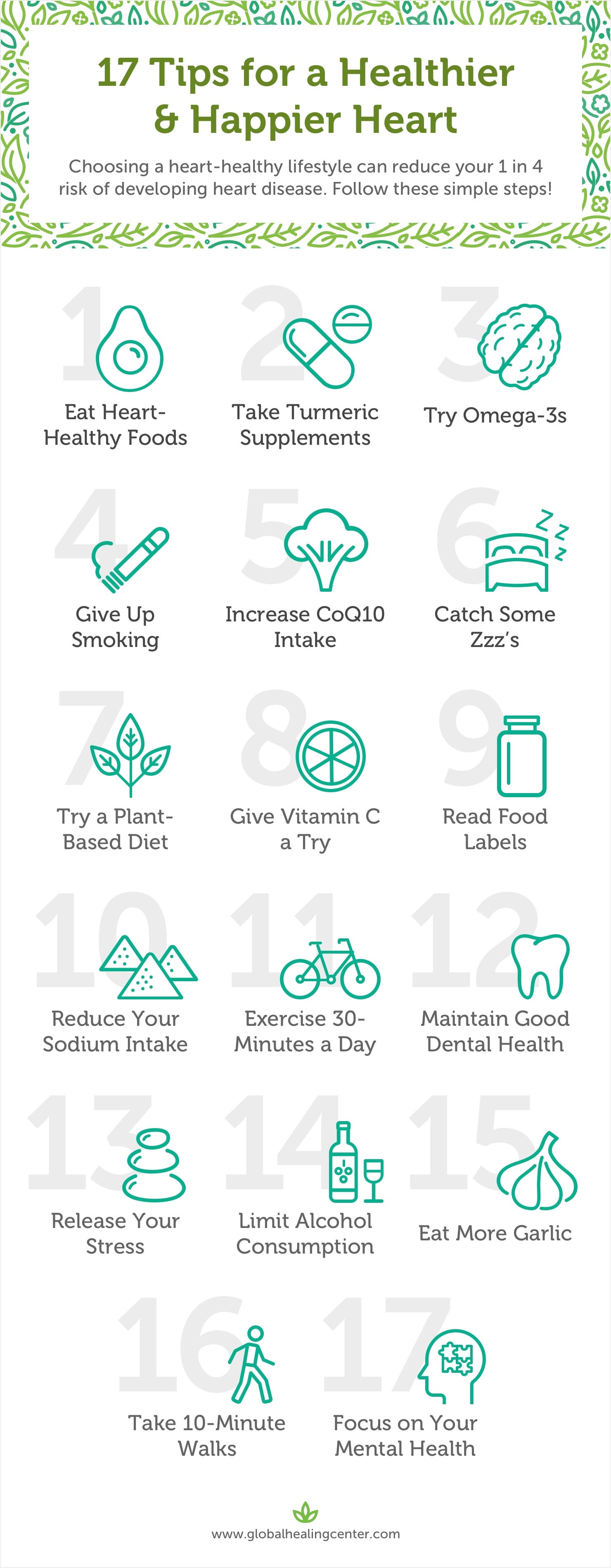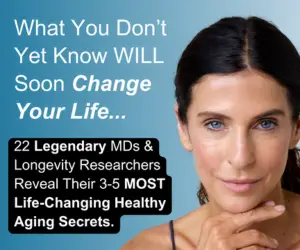Guest Writer for Wake Up World
The human heart is an organ that we all cherish, and for good reason! Be it the rush of love or the pumping of blood, our hearts are our life force.
Yet the leading cause of death in the world is not malnutrition, starvation, or violence, but heart disease. With growing accessibility to unhealthy food and more sedentary lifestyles, the world is facing a heart crisis.
Scientists have gathered a wealth of evidence on factors that affect heart health.
The bottom line? Your risk of obesity, diabetes, cardiovascular and coronary disease go hand-in-hand with poor lifestyle and dietary decisions — and you can reverse these trends with positive action steps.
17 Natural Ways to Improve Heart Health
I’ve gathered together 17 of the most valuable choices you can make for a happier, healthier heart.
1. Eat Heart-Healthy Foods
Keep an eye out for foods rich in fiber, antioxidants, potassium, and plant proteins for good heart health. The foods that you eat make up the building blocks of your tissues, including your organs.[1]
A rule of thumb is to try and stick to fruits and vegetables as much as possible. Some of the healthiest foods for your heart include:
- Berries
- Whole grains such as brown or wild rice, quinoa, or barley
- Beans and other legumes
- Unsalted, raw nuts and seeds
- Almond nut butter
- Oats
2. Take Turmeric Supplements
Did you know Ayurvedic medicine practitioners have used turmeric for thousands of years? Now clinical research has confirmed that turmeric provides amazing heart benefits.[2]
Turmeric naturally reduces redness and swelling throughout the body, normalizing your circulation and making for a healthier circulatory system.[3] It appears that the curcuminoids in turmeric normalize cytokine levels in the blood, acting as an antioxidant and protecting the heart.
3. Try Omega-3s
There is such a thing as healthy fats! Every person needs lipids (fats) because they make up the membranes of every cell in your body.
Omega-3 fatty acids, in particular, normalize your body’s clotting by smoothing blood flow. They also help maintain the rhythm of the heart.[4]
Eating foods rich in omega-3s will encourage healthy levels of arterial plaque as well as triglycerides. Triglycerides are an unhealthy form of fat that elevate risks of stroke.
Omega 3s also raise high-density lipoprotein levels, HDL, also known as “good cholesterol.” Foods such as chia seeds, hemp seeds, Brussels sprouts, walnuts, and flaxseed all contain healthy omega-3 fatty acids.[4] A further step is to try a plant-based supplement like flaxseed oil or micro-algae oil.
4. Quit Smoking
Tobacco is especially harmful to your heart because it causes plaque to build up on your artery walls. Over time, this narrows and hardens your arteries, so that your heart is pumping blood through a smaller and smaller straw.[5]
Quitting smoking is the most actionable step you can take to stop heart complications — among other health benefits. If you don’t smoke, good for you! But do your best to steer clear of second-hand smoke.
For more information, check out our how to quit smoking guide.
5. Increase CoQ10 Intake
Called the “essential nutrient,” experts recognize the incredible health benefits of CoQ10.[6] Also called coenzyme Q10 or ubiquinone, you can find CoQ10 in all air-breathing forms of life, from microbes to mammals.
CoQ10 plays a critical role in ATP creation, the energy molecule used in every cell to break down glucose — the process that keeps us alive![6]
ATP production occurs in every cell, but its density is highest in organs with a lot of action, like the heart. CoQ10 declines as you age, making supplementation helpful.
You can also find CoQ10 naturally in several plant-based foods, such as lentils, sesame seeds, pistachios, broccoli, spinach, cauliflower, oranges, and strawberries.[6] You can also buy supplements, such as Global Healing’s CoQ10 & BioPQQ® with Shilajit. This advanced blend of two of the world’s most powerful antioxidants not only supports your heart, but also provides fuel to your cells.

6. Catch Some Zzz’s
Sleep is the one time where we relax, let our hearts slow down, and give our bodies a chance to recover from the stress of the day. We often hype ourselves up on caffeine to substitute sleep, when sleep itself is truly irreplaceable.
Healthy sleep habits protect our hearts from a range of chronic concerns, such as high blood pressure, type two diabetes, and obesity.[7] That just goes to show what can happen when you don’t get enough zzz’s — aim for between seven and nine hours a night.
You can discover many natural ways to get more sleep, from avoiding cell phone and computer use at night to dabbing lavender oil on your pillow.
7. Eat a Plant-Based Diet
A diet based on fruits, vegetables, nuts, and legumes is hands down the healthiest way to eat, according to numerous studies. Besides being healthier for the environment, a plant-based diet is healthier for you!
A large study assessing how diet affected people’s risk for atherosclerosis, or hardening of the arteries found a large difference between the health of people who consumed more fruits and vegetables versus those who did not.[8]
The scientists concluded that increasing the intake of these foods reduces your risk of heart disease by 17 percent and recommended eating more leafy greens and vitamin-C rich foods.[8]
8. Give Vitamin C a Try
Vitamin C has a wide variety of health applications throughout the human body. Vitamin C plays an important role in healing tissues, producing collagen (a skin protein), and protecting arteries.[9]
Vitamin C is also an antioxidant, meaning that it reduces the amount of free radical molecules in your body, which damage arteries and heart tissue in a process called oxidative stress.
9. Read Your Food Labels
Nutrition facts labels on food can be tricky. Look closely at the ingredients, serving size, and how much of the daily value for each nutrient is provided before making judgments on the health value of a particular food.
Avoid foods that have extensive ingredient lists, especially if you see high-fructose corn syrup, sugar, or complex chemicals.
Also, limit saturated fats and sodium, and avoid trans fats altogether, but be sure to get enough vitamin A, vitamin C, calcium, and iron for your heart.[10, 11]
10. Reduce Your Sodium Intake
The World Health Organization (WHO) has recognized salt reduction as a top priority to fight the global heart crisis.
Right now, the average intake of salt is 10.5 grams a day, and the goal is to reduce it to 5.5 grams a day, per person, around the world. WHO set the goal to decrease hypertension, cardiovascular disease, and stroke worldwide.[12]
Lowering your sodium intake can directly lower your blood pressure.[13] If it’s on the international health agenda, then it should be on your agenda.
11. Start Exercising
Being overweight increases your risk for heart disease.[14] While it’s important to recognize the range in body types, nevertheless, maintaining a healthy weight will reduce your risk of heart issues. And maintaining a healthy weight is related to your physical activity level.
Experts recommend two and a half hours of exercise a week. That breaks down to less than 30 minutes a day.
Not only does burning calories lower your cholesterol and blood pressure, but exercise also reduces stress and increases happiness — which, in turn, make your heart healthier.[15]
12. Maintain Good Dental Health
Surprisingly, dental health is directly related to heart health. We know this because people who already have compromised hearts are extra susceptible to oral bacteria.[16]
It’s important to know that dental pathogens contribute to plaque building up in your arteries.[16]
Unfortunately, one study found that most children with heart conditions had not received even basic education in dental hygiene.[17] So remember to keep your mouth as clean as possible with brushing your teeth and flossing your gums, and educate your kids about dental hygiene, as well.
13. Learn to Manage Your Stress
When you feel stressed, your body does too. Stress raises blood pressure, swelling, cholesterol, triglycerides, and cortisol. It can even make your heart beat off rhythm.[18]
Many factors can lead to stress, such as poor working conditions or bad relationships — but managing it is essential to heart health. Try finding methods to release your stress such as exercise, journaling, talking to a friend, or listening to music.
14. Reduce Alcohol Consumption
Drinking alcohol affects the heart in a few ways. It increases your blood sugar levels and blood pressure to start with, but also raises the levels of triglycerides in your blood.
Keep in mind the effects of the calories and sugars in alcoholic drinks, especially if you have diabetes. Excessive drinking is the largest concern because it raises your risk of stroke, cardiac arrhythmia, and cardiac arrest.[19] Quitting, or cutting down, can have a tremendous impact on your heart.
15. Eat Some Garlic
For thousands of years, people have used garlic because of its many benefits. Ancient clay tablets dating from 2600 BC show garlic being given to Olympians to increase their stamina.
Today, studies confirm that eating garlic can reduce heart disease progression.[20] As a bonus, garlic tastes amazing and goes well in so many recipes.
16. Walk for 10 Minutes Every Day
Sixty percent of Americans do not engage in regular physical activity, and 78 percent do less than what experts recommend.[21] We all have to start somewhere.
Many moderate exercises can benefit your heart without leaving you completely breathless. Try dancing, hiking, swimming, gardening, yoga, or walking.
Walking for just 10 minutes each day will boost your mood and your health. A study found that walking three or more hours per week reduced coronary risks 30 to 40 percent![21]
17. Take Note of Your Mental Health
Many people with heart disease also suffer from mental health disorders.[22] Our hearts are directly related to our mental wellbeing.[23]
If you suffer from anxiety, depression, or anger concerns, you could be more at risk for immune dysfunction, inflammation, or eventual coronary artery disease.
You can potentially prevent serious heart complications by seeking counseling early on. If you aren’t finding relief from your own outlets, seek the help of a local professional to help live a happier and longer life.
Points to Remember
Smoking, eating saturated fat, suffering from stress, and living a sedentary lifestyle are some of the risks that contribute to poor heart health. But just a few positive choices can break this trend.
Paying attention to what you eat and the habits you build can make a direct difference in your heart health. I recommend staying active, sleeping well, eating lots of fresh fruits and vegetables, reading labels, and adding supplements like turmeric or CoQ10.
Specific, simple, and actionable steps will put you on the right path for a healthy heart and a long life. I hope that the information that I shared with you in this article empowers you to make positive heart choices.
- Tuso PJ, et al. Nutritional update for physicians: plant-based diets. Perm J. 2013;17(2):61-66.
- Chainani-Wu N. Safety and anti-inflammatory activity of curcumin: a component of turmeric (Curcuma longa). J Alt & Compl Med. 2003;9(1):161-168.
- Wongcharoen W, et al. Effects of curcuminoids on frequency of acute myocardial infarction after coronary artery bypass grafting. Am J Cardiol. 2012;110(1):40-44.
- Kris-Etherton PM, et al. Omega-3 fatty acids and cardiovascular disease: new recommendations from the American Heart Association. 2003:151-152.
- Morita A. Tobacco smoke causes premature skin aging. J Dermatol Sci. 2007;48(3):169-175.
- Saini R. Coenzyme Q10: the essential nutrient. J Pharm Bioallied Sci. 2011;3(3):466-467.
- Sleep and Chronic Disease. Centers for Disease Control and Prevention, US Department of Health and Human Services. Updated 8 Aug 2018. Accessed 22 Jan. 2019.
- Moser MA, Chun OK. Vitamin C and heart health: a review based on findings from epidemiologic studies. Int J Mol Sci. 2016;17(8):1328.
- Lynch SR, Cook JD. Interaction of vitamin C and iron. Ann N Y Acad Sci. 1980;355:32–44.
- Hu FB, et al. Dietary saturated fats and their food sources in relation to the risk of coronary heart disease in women. Am J Clin Nutr. 1999;70(6):1001-1008.
- How to Understand and Use the Nutrition Facts Label. US Food and Drug Administration. Updated 3 Jan 2018. Accessed 22 Jan 2019.
- Aburto NJ, et al. Effect of lower sodium intake on health: systematic review and meta-analyses. BMJ. 2013;346:f1326.
- Ha SK. Dietary salt intake and hypertension. Electrolyte Blood Press. 2014;12(1):7-18.
- Stone, NJ, et al. 2013 ACC/AHA guideline on the treatment of blood cholesterol to reduce atherosclerotic cardiovascular risk in adults: a report of the American College of Cardiology/American Heart Association Task Force on Practice Guidelines. J Am Coll Cardiol. 2014;63(25 Pt B):2889-2934.
- Borg GA. Psychophysical bases of perceived exertion. Med Sci Sports Exerc. 1982;14(5):377-381.
- Slavkin HC. Does the mouth put the heart at risk?. J Am Dent Assoc. 1999;130(1):109-113.
- Balmer R, Bu’Lock FA. The experiences with oral health and dental prevention of children with congenital heart disease. Cardiol Young. 2003;13(5):439-443.
- Stress and Your Heart: MedlinePlus Medical Encyclopedia. MedlinePlus, US National Library of Medicine Website. Updated 22 Feb 2018. Accessed 22 Jan 2019.
- Alcohol and Heart Health. American Heart Association. Updated 15 Aug 2014. Accessed 22 Jan 2019.
- Banerjee SK, Maulik SK. Effect of garlic on cardiovascular disorders: a review. Nutr J. 2002;1:4.
- Manson JE, et al. A prospective study of walking as compared with vigorous exercise in the prevention of coronary heart disease in women. N Engl J Med. 1999;341(9):650-658.
- Ormel J, et al. Mental disorders among persons with heart disease—results from World Mental Health surveys. Gen Hosp Psychiatry. 2007;29(4):325-334.
- Kemp AH, Quintana DS. The relationship between mental and physical health: insights from the study of heart rate variability. Int J Psychophys. 2013;89(3):288-296.
Originally published at Global Healing Center and reproduced here with permission.
About the author:
Dr. Edward F. Group III (DC, ND, DACBN, DCBCN, DABFM) founded Global Healing Center in 1998 with the goal of providing the highest quality natural health information and products. He is world-renowned for his research on the root cause of disease. Under his leadership, Global Healing Center earned recognition as one of the largest natural and organic health resources in the world. Dr. Group is a veteran of the United States Army and has attended both Harvard and MIT business schools. He is a best-selling author and a frequent guest on radio and television programs, documentary films, and in major publications.
Dr. Group centers his philosophy around the understanding that the root cause of disease stems from the accumulation of toxins in the body and is exacerbated by daily exposure to a toxic living environment. He believes it is his personal mission to teach and promote philosophies that produce good health, a clean environment, and positive thinking. This, he believes, can restore happiness and love to the world.
For more, please visit Global Healing Center.
Unlock the wisdom of the ancient shamans of the Andes and Amazon in a free online event introducing the Sacred Andean Codes. These Munay-Ki Rites offer a profound path to spiritual awakening, connecting you with nature’s elements to ignite transformation and align with your higher purpose.
One rite you’ll explore is the Five Bands of Power — energetic belts woven around your body with the essence of earth, water, fire, air, and light. These bands dissolve negative energies and protect you physically and psychically, empowering you to feel safe and dismantle emotional barriers.
This is your opportunity to experience sacred practices that foster personal healing and collective change. Don’t miss this free transformative journey into Andean wisdom. Sign up now!
If you’ve found value in our articles, we invite you to support the release of our brand-new book, “Gratitude Practices for Kids: A Practical Guide for Adults to Instill a Spirit of Appreciation and Positivity in the Next Generation.“
“Gratitude Practices for Kids” brings together over 25 innovative and accessible practices designed to enhance gratitude in everyday life. This comprehensive guide is backed by 17 scientific studies, ensuring each concept is grounded in research, underscoring our commitment to nurturing growth, emotional intelligence, and positive interactions between adults and children.
We encourage you to opt for the paperback version to celebrate this new release. Dive into its fresh pages away from digital distractions, allowing you to immerse yourself in the transformative practices it offers.
Over recent years, Wake Up World has faced significant online censorship, which has impacted our financial ability to operate. Moving into book publishing represents a strategic step to secure the ongoing funds needed to continue our mission. By purchasing Gratitude for Kids, you help us keep our content free and accessible to everyone, avoiding needing a paywall. With over 8,500 articles published in the last 13 years, we remain dedicated to keeping our valuable content open to all.











